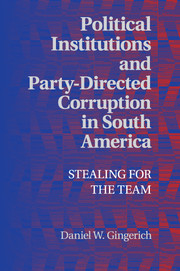Book contents
- Frontmatter
- Contents
- Preface
- Acknowledgments
- 1 Institutions and Political Corruption: A Framework
- 2 Institutional Design and the Case for Mechanism-Based Analysis
- 3 Ballot Structure, Political Corruption, and the Performance of Proportional Representation
- 4 An Approach to Overcoming the Fundamental Problem of Inference in Corruption Studies
- 5 Political Career Paths in the Bureaucracy and the Use of Institutional Resources in Bolivia, Brazil, and Chile
- 6 Conclusion
- Bibliography
- Index
- Miscellaneous Endmatter
4 - An Approach to Overcoming the Fundamental Problem of Inference in Corruption Studies
Published online by Cambridge University Press: 18 December 2013
- Frontmatter
- Contents
- Preface
- Acknowledgments
- 1 Institutions and Political Corruption: A Framework
- 2 Institutional Design and the Case for Mechanism-Based Analysis
- 3 Ballot Structure, Political Corruption, and the Performance of Proportional Representation
- 4 An Approach to Overcoming the Fundamental Problem of Inference in Corruption Studies
- 5 Political Career Paths in the Bureaucracy and the Use of Institutional Resources in Bolivia, Brazil, and Chile
- 6 Conclusion
- Bibliography
- Index
- Miscellaneous Endmatter
Summary
Before one evaluates theories about the relationship between institutions and political corruption, one first ought to establish that the empirical analysis of political corruption is a feasible enterprise. Doing so is no mean feat. In this chapter, I present a new approach to the empirical analysis of corruption. Although the approach is tailored toward the specific problem of understanding why public employees might engage in various forms of political corruption, the methods I introduce are quite general, and they can readily find application in other pursuits in the burgeoning field of corruption studies.
In defining my approach to the problem, I began with the following question: Were the ideal data set available to study the determinants of corrupt behavior, what might the core characteristics of such a data set be?
Clearly, one desirable characteristic of such a data set would be that it consists of observations at the individual level. Of all the relevant actors considered in the social sciences, individual human beings are the sole possessors of choice. Although it is often a convenient (and necessary) shorthand to speak of aggregations such as unions, parties, and nation-states as if they were unitary actors – and thus possessors of choice – in truth, the outcomes typically associated with such entities stem from complex processes of collective choice in which a large number of individual decisions – mediated by formal rules and cultural values – lead to distinctive patterns of organizational behavior.
- Type
- Chapter
- Information
- Political Institutions and Party-Directed Corruption in South AmericaStealing for the Team, pp. 117 - 163Publisher: Cambridge University PressPrint publication year: 2013



